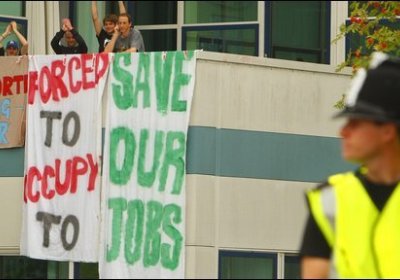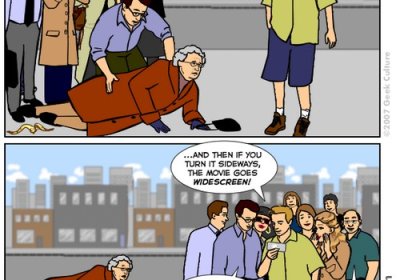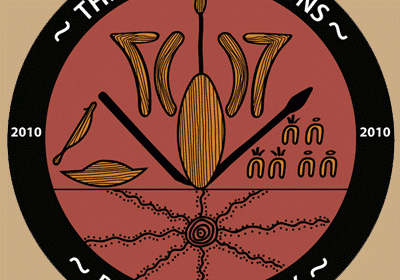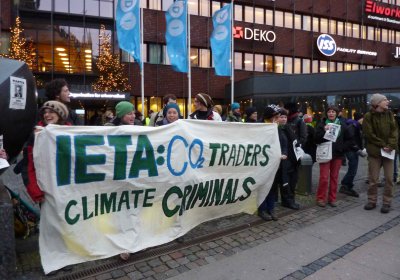After spending over two weeks on the road together, students and activists onboard the New South Wales “Indigenous Solidarity Ride” stopped at Olympic Dam on July 15 to protest against a proposed uranium mine expansion.
The bus riders travelled through rural NSW and South Australia to attend the Defending Indigenous Rights: Land, Law, Culture convergence in Alice Springs over July 7-9. They also took part in the Students of Sustainability conference in Adelaide.
Environment
One year after workers occupied the Vestas wind turbine factory on the Isle of Wight in protest at the company’s decision to cease production, a new organisation, Sureblades set up by former Vestas employees has risen from the ashes. It is due to start making blades within two months just yards from the closed factory.
The launch of the Nuclear Freeways Campaign took place outside federal resources minister Martin Ferguson’s office on July 30.
The launch was a send-off for a group of activists from Friends of the Earth who will travel the likely route nuclear waste will be transported from Sydney to a proposed nuclear waste dump at Muckaty station in the Northern Territory.
Protesters had coal trains backed up for kilometres at the small mining town of Collinsville, inland from Bowen, north Queensland, on July 26. They were protesting against the dust and noise of the trains, and the plan to upgrade the rail line to bring up to 70 coal trains a day through their town.
About 15 coal trains a day rumble through the middle of Collinsville. The residents picketed the line for three days, bringing coal train traffic to a complete halt.
“Yes, the notable features with iPhone 4 — both the device and the iOS4 — are mostly tweaks”, said a June 22 review on the popular site BoingBoing.net. “But what tweaks they are.”
In the interests of full disclosure, I’ll admit I have no idea what “iOS4” means. But my eye was caught by the admission that the iPhone 4, launched in Australia on July 29, was almost the same as the iPhone 3.
Corporations use “inbuilt obsolescence” as part of artificially creating markets. This means the products they sell are deliberately made to break down — so we have to keep buying more.
The First Nations Political Party (FNPP) is a new party contesting the upcoming federal election. The party will contest two lower house seat a and field a four-person senate ticket in WA. It will also run a senate candidate and content a lower house seat in the Northern Territory.
Aboriginal activists Marianne Mackay and Glenn Moore began working towards forming an Indigenous political party in late 2009. They have a goal to getting Aboriginal people elected to parliament.
“We need a pure Aboriginal voice in parliament”, Moore told Green Left Weekly.
Two recent reports, released by NASA and the US National Climate Data Centre, have confirmed that last month was the warmest June since records began.
June was the fourth consecutive month that had broken temperature records, the US National Oceanic and Atmospheric Administration (NOAA) said. Global monthly records were also broken in March, April and May.
June was the 304th month in a row that recorded a global average temperature higher than the 20th century average. February 1985 was the last month temperatures fell below the average.
The global carbon market, which trades “pollution rights” to encourage industry to cut greenhouse gas emissions, grew in 2009. Far from signaling a success, this reflects a huge increase in fraud, the dumping of surplus emissions permits by industry, and a rise in financial speculation.
Over-fishing threatens caviar
“Lovers of fine food face a shortage of Beluga caviar that may last more than a decade. Eurasian states are discussing a ban on catching sturgeon in the Caspian Sea.
“Over-fishing has reduced the population of the fish that produces the delicacy by 90 per cent.
“It has pushed the price up nearly sevenfold to $14,340 per kilogram, or $1434 for enough to make a sandwich.
“The Caspian Sea is home to four-fifths of the sturgeon bearing the most sought after varieties of caviar ...
“What the hell did we do to deserve this?”, BP CEO Tony Hayward asked fellow executives in the company’s London office, days after the April 20 explosion of the Deepwater Horizon oil rig in the Gulf of Mexico, the April 29 New York Times said.
Eleven workers died in the explosion that has generated the US’s worst ever environmental disaster.
BP finally managed to place a cap over the well on July 15, although its status remains tenuous. Associated Press reported seepage detected from the cap on July 21.
On July 17, the Adelaide-based Climate Emergency Action Network (CLEAN SA) hosted a forum in Port Augusta detailing the Zero Carbon Australia 2020 Stationary Energy Plan recently launched by Beyond Zero Emissions (BZE).
Forget about the climate science and the record high temperatures. Prime Minister Julia Gillard has decided she doesn’t need a serious climate change policy to win the federal election.
In its place, she kicked off her election campaign on July 18 with a “sustainable Australia” policy. It promised a future of low population growth, which “preserves our quality of life and respects our environment”.
Opposition leader and climate denier Tony Abbott was quick to say he fully agreed with this vision, but was even more committed to it than Gillard.
- Previous page
- Page 283
- Next page











